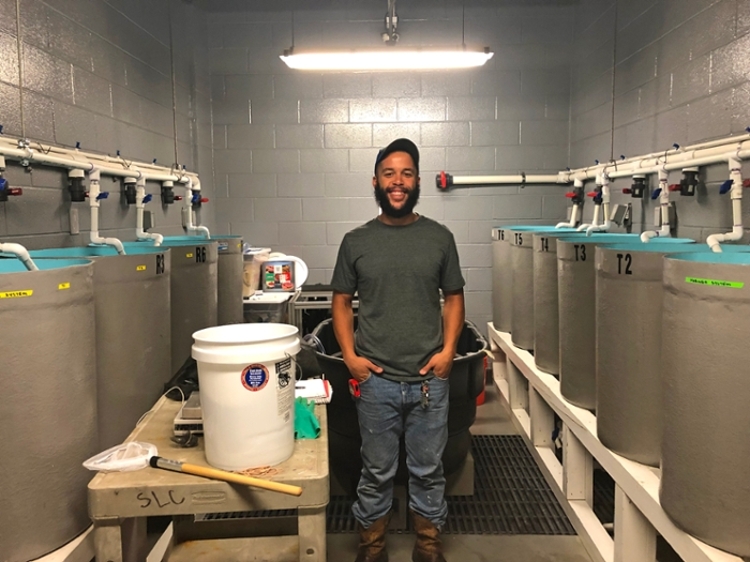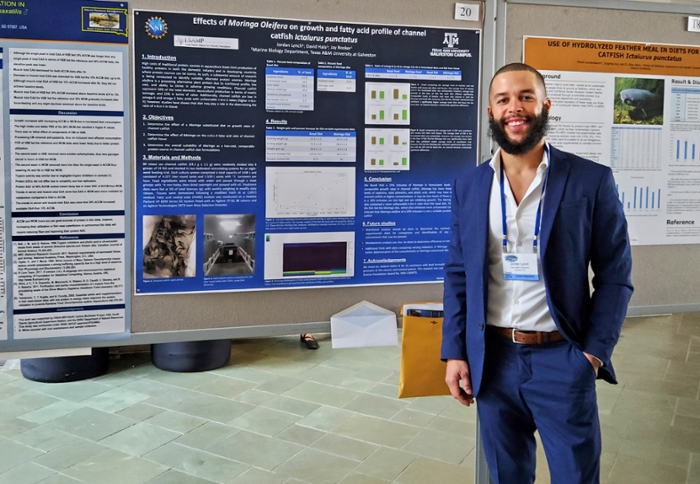Blood, Sweat & Saltwater: Jordan Lynch '20 is on a Mission
December 9, 2020
Tweet
By Andréa Bolt, Communications Specialist, Division of Marketing & Communications
Jordan Lynch’s thirtieth birthday is December 20 and his gift to himself is going to be a five-day solo camping and fishing trip...plus a bachelor’s degree or two.
It was only five years ago that Lynch was bouncing around from city to city doing traveling construction. He worked as a boilermaker in Wyoming, in his native Iowa at a nitrogen plant, and another company updating and retrofitting wastewater plants. But after a severe injury left him couch-bound for two months, Lynch did some thinking.
“I realized I needed to go back to college or that I was going to work construction until I died. In construction, I was making good money, but it just wasn’t fulfilling enough for me. So I sat there and I asked myself, ‘What do I want to do?’ I ran through lists of things but I was always interested in marine biology, animals, and coming from Iowa, the ocean is super exotic,” Lynch said with a laugh.
So, he did what any good Millennial would do - he Googled.
“Texas A&M University at Galveston was one of the first ones to come up and I thought, ‘Well this is it.’ It was the only school I applied to, and I told myself that if I got in, I was moving to Texas.”
An acceptance letter and a few months later, Lynch found himself a new resident of Galveston, Texas.
“Where I’m from, outside Perry, Iowa, is super small. So for me, Galveston was a huge place,” Lynch explains.
As a realist with a construction background, Lynch swapped his marine biology goals for aquaculture once he realized the study of growing and cultivating aquatic species combined with his inherent building and agriculture skills was an ideal fit. Thankfully, Texas A&M-Galveston offers the dual degree Marine Biology and Marine Fisheries program, so Lynch will technically be graduating with two bachelor’s degrees.
Once Lynch settled into his academic program, he knew he’d made the right choice.
“I was honestly kind of nervous to start. I dropped out of college at 19, went from working six to seven years of construction, then getting back into the swing of things, plus working multiple jobs while I was in school, I was worried,” he said.
But no need.
“Despite not having been in school for a long time, it was when I was sitting in my first semester classes that I knew. I was getting A’s on every exam, a consistent top performer. I’ve always enjoyed science but everything just kind of clicked and that reflected in my grades and performance at school. That was when I realized I’d made the right decision, that Texas A&M-Galveston was it.”
Like he said, Lynch worked the entire time during his studies, as a student, an employee, and a researcher.
For his major research project, Jordan studied alternative plant proteins to use as a food source for farm-raised fish. He explained that common fish feed ingredients like corn or wheat can be harder to come by in some areas and that they tend to be more expensive as they compete with the agriculture market for feed sources.
He turned to the health superfood Moringa oleifera. For his study, he utilized channel catfish, which he explained are the number one fish species in tonnage and value grown for various food needs in the United States.
Lynch undertook a 56-day feeding trial testing out the moringa with another formula, feeding two separate fish systems to identify what the health and behavior differences were.
“I was figuring out all the formulations and I produced my own food pellets, meaning I mixed, ground and pelleted them. I had to write a whole animal use protocol on my own. I spent many long nights in the Sea Life Facility, but I was able to determine growth rates, fatty acid profiles, and more. The study actually did not go as planned, but the method of derivatizing fish fatty acids didn’t exist before my project,” Lynch said with pride.
Lynch worked alongside Department of Marine Biology Assistant Professor Dr. David Hala and Regents Professor Dr. Jay Rooker who helped him further apply his fatty acid analysis to the ongoing work of a graduate student under Hala. This resulted in Lynch, an undergraduate, being published in an academic paper.
Hala said this was merely one example displaying Lynch’s dedication to his studies.
“Jordan exemplifies the Aggie spirit in that he goes above and beyond in his commitment to his studies and research. His sincerity, hard work, and dedication to academics make him an exemplar of the very best of our academic family,” stated Hala, “We’re going to miss him.”
Lynch is excited to announce he will be continuing his studies at Texas A&M University, where he plans to launch straight into a doctoral program in the Department of Wildlife & Fisheries Sciences.
But once again, Lynch took his success in his own hands to make it happen.
During his time as an Aggie by the Sea, Lynch attended as many academic conferences as he could, sometimes on his own dime. Before the COVID-19 pandemic hit, he traveled to Hawaii to present at the Aquaculture America 2020 conference, he’s been to New Orleans and Long Beach. Ahead of the conferences, Lynch would research the attendees and cold call those in the industry he wanted to make a point to meet or connect with.

“That’s actually how I met my Ph. D. advisor, I didn’t plan to do grad school, but Dr. Delbert Gatlin was there at a conference and he helped convince me this was my next step.”
Lynch says higher education is a hustle and that students have to be willing to think outside the box and take advantage of every possible opportunity to get themselves ahead. That’s why he’s grateful for those who have helped him along the way.
Lynch said Former Department of Marine Biology Instructional Assistance Professor Dr. Orissa Moulton applauded him for his ability to hustle, but she also informed him of and eventually helped him secure aid via the Louis Stokes Alliance for Minority Participation (LSAMP), a National Science Foundation (NSF) program. The LSAMP funds universities and academic programs “that implement comprehensive, evidence-based, innovative, and sustained strategies that ultimately result in the graduation of well-prepared, highly-qualified students from underrepresented minority groups who pursue graduate studies or careers in STEM.”
“The more I got to know Jordan, the more he impressed me with his sustained energy and crystal-clear sense of purpose for his time as an undergraduate at Texas A&M-Galveston,” Moulton commented. “In the brief two years I had the privilege of working directly with Jordan, he proved himself not just as an exceptional student, but as a creative, careful, and effective researcher. He will do great things.”
The opportunities he’s earned and the next step in his journey have him thinking even further into the future, and further across the globe.
Eventually, Lynch would like to own and operate his own fish farm, an eventuality his aquaculture mentor and Sea Life Facility Manager Katie St. Clair ‘07 has zero doubts about.
“The day I met Jordan, he told me that his goal was to start his own aquaculture business, and through his experiences and preparation here at Texas A&M-Galveston, he is well on his way to doing just that,” she said. “He’s been an integral part of the Sea Life Facility staff for the past three years, providing exceptional care to all of the animals housed in the facility. He has also served as peer leadership, sharing his knowledge of aquaculture practices and providing hands-on training for new staff members, and was always willing to take on new duties and projects. Outside the classroom, he’s secured multiple professional certifications from the Aquatic Animal Life Support Operators organization, and a summer internship at a commercial aquaculture farm.”
But Lynch isn’t finished there. His eventual goal is to hone his farming techniques to then start a non-profit that will bring aquaculture best practices and knowledge to developing countries and areas in need.
Whether by land or by sea, this self-proclaimed “Iowa farm boy” might be a long way from home, but he knows exactly where he’s meant to be and he’s worked to get himself there every step of the way.
###
Media contact:Communications Specialist
a_bolt@tamug.edu
More:
Read more about Health & Environment
Read more about Science & Technology
Read more about Marine Biology
Read more about Marine Sciences